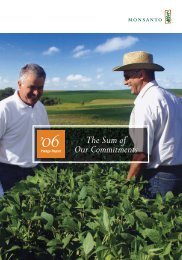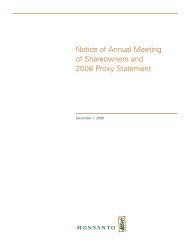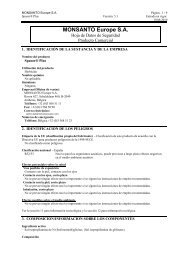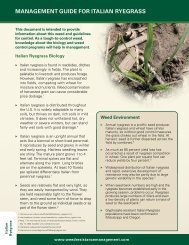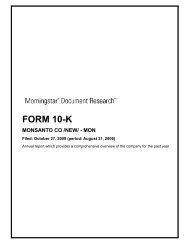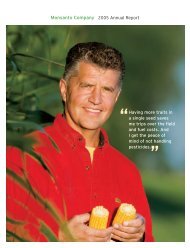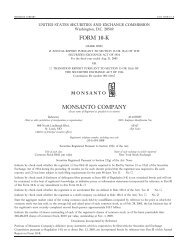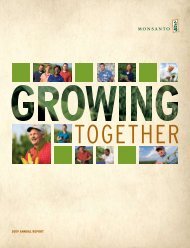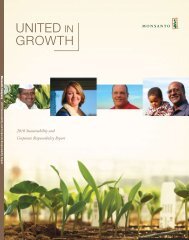Create successful ePaper yourself
Turn your PDF publications into a flip-book with our unique Google optimized e-Paper software.
WATERBIRDS ON WORKING LANDS<br />
The National Audubon Society received a $2.1 million three-year<br />
grant from the <strong>Monsanto</strong> Fund to identify the best farming practices<br />
that best help improve environmental health and wildlife habitats<br />
with a focus on agricultural lands and wetlands for waterbirds in the<br />
U.S. Waterbirds are potentially powerful bioindicators of water quality<br />
and the overall health of aquatic ecosystems. The program will study<br />
scientific data related to farming methods, environmental indicators<br />
and bird populations. Audubon will then engage with the farming<br />
community to communicate the multiple benefits of using the<br />
identified best practices. The grant will enable Audubon to extend<br />
its waterbird conservation work and to partner with growers in<br />
promoting environmentally responsible farming systems.<br />
YieldGard Rootworm Corn – Agronomic,<br />
Economic and Environmental Impacts<br />
Corn rootworm is the most damaging insect pest in corn crops, resulting in millions of pounds of insecticide<br />
use and more than $1 billion annually in crop losses and control costs. YieldGard Rootworm corn — one of<br />
<strong>Monsanto</strong>’s most recently commercialized products — contains a protein from Bacillus thuringiensis (Bt),<br />
a common soil microbe, to provide in-plant protection against corn rootworm.<br />
YieldGard Rootworm corn had its first commercial planting in 2003. A modeling study conducted by Dr. Marlin<br />
Rice of Iowa State University estimated the potential annual impacts of the use of YieldGard Rootworm corn based<br />
on 10 million U.S. planted acres. Analysis of actual commercial field data will be the focus of future reports.<br />
Rice found that YieldGard Rootworm corn could provide a number of agronomic, economic, worker safety<br />
and environmental benefits. 10 It could reduce the amount of soil-applied insecticide needed by 5.3 million<br />
pounds (active ingredient). This could result in a corresponding reduction in labor, worker exposure, and<br />
fossil fuels used in the manufacture, transport, and application of insecticide. Rice also found that YieldGard<br />
Rootworm corn could increase yield protection from 9 percent to 28 percent relative to no insecticide use,<br />
and from 1.5 percent to 4.5 percent relative to control with a soil insecticide. He estimates that farmers would<br />
see an economic benefit of $231 million from yield gains ($25 to $75 an acre relative to no insecticide control,<br />
$4 to $12 an acre relative to control with a<br />
Table 1: Potential Impacts of Yieldgard Rootworm Corn for<br />
Control of Rootworm Pests<br />
Impact* Resources Reduced<br />
CONSERVATION OF WATER RESOURCES » 5.7 million gallons<br />
REDUCTION OF DIESEL FUEL » 3.1-5.2 million gallons<br />
REDUCTION IN PLASTIC CONTAINERS<br />
FOR INSECTICIDES » 1.2 million containers<br />
REDUCTION IN AVIATION FUEL » 68,845 gallons<br />
* Annual impact based on 10 million planted acres of YieldGard Rootworm corn<br />
PHOTO: PAUL AND ENG-LI GREEN<br />
soil insecticide).<br />
WATERBIRDS ARE<br />
BIOINDICATORS OF<br />
WATER QUALITY.<br />
In addition, a study conducted by Alston et al.<br />
found that YieldGard Rootworm corn would<br />
generate $460 million more in incremental<br />
economic benefits a year than corn treated<br />
with a soil insecticide. 11<br />
{ MONSANTO COMPANY 2004 PLEDGE REPORT: PAGES 6-7 }



